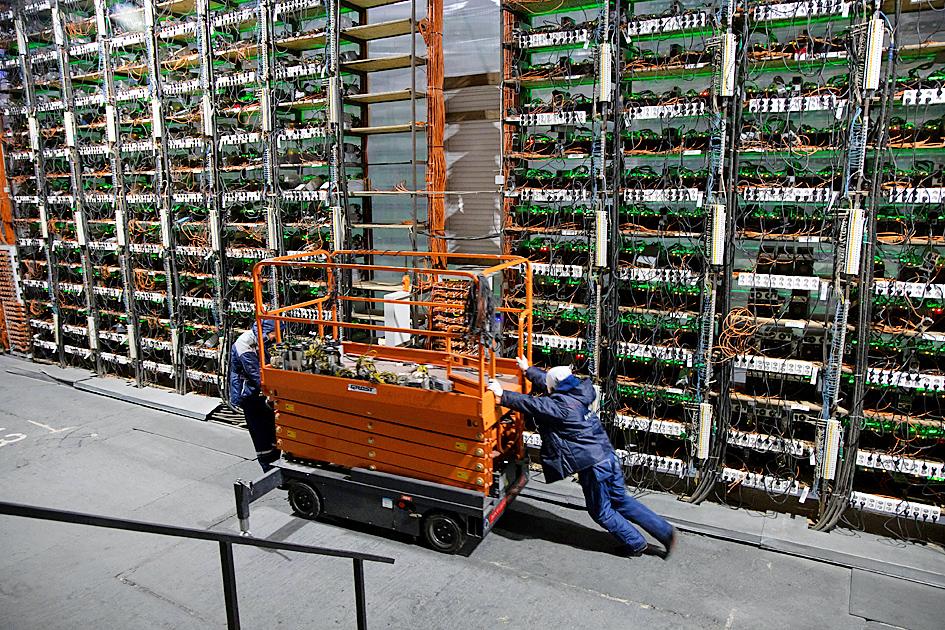Estonia has moved to calm investor fears about tougher rules on cryptocurrency, a sector that has been a target of regulatory scrutiny for the Baltic nation since at least 2019.
The country is considering new rules that would enforce due diligence, audits and higher levels of capital for crypto firms ahead of a review of its policies to counter money laundering this quarter.
The proposed rules still need parliamentary approval.

Photo: Bloomberg
The Estonian Ministry of Finance issued a statement and a list of frequently asked questions after speculation that the new rules would shut down cryptowallets and ban trading in bitcoin.
Estonia “recently introduced draft legislation that would tighten regulation of virtual asset service providers,” the ministry said in a statement.
“However, Estonia has no plans to make owning cryptocurrencies illegal, as some misconceptions on social media claim,” it said.
The Baltic nation was one of the first countries to grant cryptocurrency licenses in 2017, attracting a surge in companies interesting in doing business in the sector.
It has since revoked about 2,000 of these and only about 400 licensed companies remain.
Estonia took a tougher stance on crypto after allegations that billions of dollars of illicit cash flowed through the local unit of Denmark’s largest lender Danske Bank A/S, in what was then Europe’s biggest ever dirty-money scandal.
Estonian Financial Intelligence Unit director Matis Maeker told local media in October that all cryptolicenses could be revoked and companies forced to reapply for accreditation.
His spokesman later said that this was not the official view of the agency and the government did not pursue it.
Separately, bitcoin is starting off the new year on a down note.
Bitcoin, which is the largest digital coin by market valuation, fell as much as 2.8 percent during Monday’s session to US$45,715.
That means it was trading below its average price over the past 200 days, which currently stands at US$47,923.
The session is setting bitcoin up for its seventh consecutive close below that threshold, which is watched closely by chartists.
“Bitcoin is acting just like another risk asset,” said Steve Sosnick, lead strategist at Interactive Brokers LLC. “In some ways, it’s a victim of its success, because so much risk capital has moved into bitcoin and to a certain extent other cryptos.”
Technicians are also watching bitcoin’s relative strength index, which is nearing oversold territory.
Strategists at Oppenheimer say that bitcoin’s heightened volatility makes it difficult for them to trade.
Still, if they use its 200-day moving average stat in the same way that they utilize it for stocks, then they foresee it could break above US$65,000 — as long as it maintains US$46,000, they said in a note.
Cryptocurrencies overall finished last year on a sour note. Bitcoin fell roughly 19 percent last month, one of its worst months of the year.
The Bloomberg Galaxy Crypto Index, which tracks a handful of some of the largest coins, lost nearly 23 percent in that period.

UNCERTAINTY: Innolux activated a stringent supply chain management mechanism, as it did during the COVID-19 pandemic, to ensure optimal inventory levels for customers Flat-panel display makers AUO Corp (友達) and Innolux Corp (群創) yesterday said that about 12 to 20 percent of their display business is at risk of potential US tariffs and that they would relocate production or shipment destinations to mitigate the levies’ effects. US tariffs would have a direct impact of US$200 million on AUO’s revenue, company chairman Paul Peng (彭雙浪) told reporters on the sidelines of the Touch Taiwan trade show in Taipei yesterday. That would make up about 12 percent of the company’s overall revenue. To cope with the tariff uncertainty, AUO plans to allocate its production to manufacturing facilities in

TAKING STOCK: A Taiwanese cookware firm in Vietnam urged customers to assess inventory or place orders early so shipments can reach the US while tariffs are paused Taiwanese businesses in Vietnam are exploring alternatives after the White House imposed a 46 percent import duty on Vietnamese goods, following US President Donald Trump’s announcement of “reciprocal” tariffs on the US’ trading partners. Lo Shih-liang (羅世良), chairman of Brico Industry Co (裕茂工業), a Taiwanese company that manufactures cast iron cookware and stove components in Vietnam, said that more than 40 percent of his business was tied to the US market, describing the constant US policy shifts as an emotional roller coaster. “I work during the day and stay up all night watching the news. I’ve been following US news until 3am

COLLABORATION: Given Taiwan’s key position in global supply chains, the US firm is discussing strategies with local partners and clients to deal with global uncertainties Advanced Micro Devices Inc (AMD) yesterday said it is meeting with local ecosystem partners, including Taiwan Semiconductor Manufacturing Co (TSMC, 台積電), to discuss strategies, including long-term manufacturing, to navigate uncertainties such as US tariffs, as Taiwan occupies an important position in global supply chains. AMD chief executive officer Lisa Su (蘇姿丰) told reporters that Taiwan is an important part of the chip designer’s ecosystem and she is discussing with partners and customers in Taiwan to forge strong collaborations on different areas during this critical period. AMD has just become the first artificial-intelligence (AI) server chip customer of TSMC to utilize its advanced

Six years ago, LVMH’s billionaire CEO Bernard Arnault and US President Donald Trump cut the blue ribbon on a factory in rural Texas that would make designer handbags for Louis Vuitton, one of the world’s best-known luxury brands. However, since the high-profile opening, the factory has faced a host of problems limiting production, 11 former Louis Vuitton employees said. The site has consistently ranked among the worst-performing for Louis Vuitton globally, “significantly” underperforming other facilities, said three former Louis Vuitton workers and a senior industry source, who cited internal rankings shared with staff. The plant’s problems — which have not